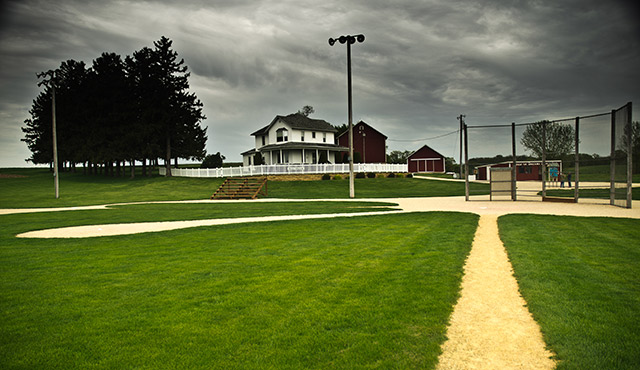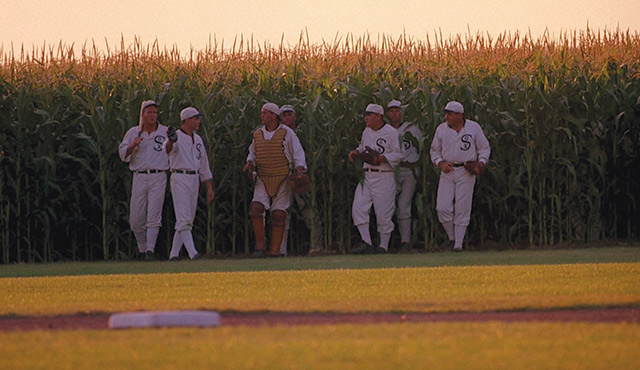My brother and I had been driving east most of the day, grinding out the miles, holstered into a tiny car pointed toward Chicago. The Iowa landscape rose and fell, mile after mile of lush farmland under a lowering dark gray sky that killed conversation and enveloped the car in a series of quick squalls every few minutes. When we arrived in the little town of Dyersville (population 4,100), about 25 miles west of Dubuque and the Mississippi River, the streets were glistening with recent rain and we were stiff-legged and claustrophobic.
It didn’t feel much like a pilgrimage. But it was.
Brian and I had vowed not to leave Iowa without visiting a small patch of earth a couple of miles northeast of town at 28995 Lansing Road.
“Ray, people will come, Ray. They’ll come to Iowa for reasons they can’t even fathom. They’ll turn up your driveway, not knowing for sure why they’re doing it. They’ll arrive at your door as innocent as children, longing for the past.”
And suddenly, there it was. The glorious white farmhouse with the white picket fence hard by the stately red barn. And the rugged stand of tall, sheltering evergreens on the other side. And all the way to the horizon, gently undulating farmland, loamy and green and brown, rough and fertile.
And in the middle of it all, the field. Not perfect, not manicured, but a real, working ball field, with scattered puddles in the coarse red clay, and ill-defined edging on the base paths, and slightly patchy grass that needed mowing.
It didn’t matter. It was the Field of Dreams.
“And they’ll walk out to the bleachers, and sit in shirt-sleeves on a perfect afternoon. They’ll find they have reserved seats somewhere along one of the baselines, where they sat when they were children and cheered their heroes.”
It felt like hallowed ground. Two decades before, it was a cornfield and nothing more, but now—thanks to a location scout with a genius imagination and a story that tears the heart from your chest and demands that you believe—it was a place where hope and memories and faith in things unseen sprang from every blade of grass.
We took turns standing on the mound where Kevin Costner’s Ray Kinsella pitched to Ray Liotta’s Shoeless Joe Jackson. I took up my old position at first base, crouching and staring in to the plate, smacking a fist into an invisible glove. My brother took a seat in the bleachers and thought of James Earl Jones’ Terrence Mann, and did a one-man wave. And, of course, we both dug in at the plate and stared out at the edge of the outfield, where the reanimated White Sox disappeared into the corn.
The one disappointment: no corn. The old bromide “knee-high by the Fourth of July” was proving true; it was late June and the shoots had barely broken through the soil. It didn’t matter. We took photos of each other reaching through the barrier between the heaven that was Iowa and the real thing, grinning like fools.
“And they’ll watch the game, and it’ll be as if they’d dipped themselves in magic waters. The memories will be so thick they’ll have to brush them away from their faces.”
Specific scenes appeared, suddenly and vividly: the graceful and improbable redeemed spirit of Shoeless Joe, jacking pitch after pitch into the corn; the other players, still crusty and crude but thoroughly forgiven, laughing like children; the reclusive and embittered author Terrence Mann, transformed and filled with purpose and delight, poring through “The Baseball Encyclopedia;” Annie Kinsella sitting in the porch swing with little Karin, giggling and filling Ray’s heart; the mysterious Archie “Moonlight” Graham, meeting his destiny and then abandoning it to save Karin; and John Kinsella, Ray’s father, bringing illumination to his son, re-igniting a long-dormant love, completing the circle and fulfilling the promise of The Voice.
Yes, The Voice. Listed in the film’s credits as Himself.
“This field, this game, is a part of our past, Ray. It reminds us of all that once was good, and it could be again. Oh, people will come, Ray. People will most definitely come.”
Millions of grown men weep unashamedly while watching “Field of Dreams.” Why? It isn’t because they love baseball or enjoy a good yarn or appreciate excellent acting or even because they like to recall playing catch with Dad. Hearts open to “Field of Dreams” because it offers a crystalline popular metaphor for the unconditional love of God: a good and earnest (albeit bewildered) man who faithfully follows what he knows in his soul to be true, who perseveres through uncertainty and setbacks to become the agent of transformation, enlightenment and deliverance for a baseball field full of worthy souls desperate for a second chance. Everyone, in the end, becomes precisely what he was created to be, and glories in it. All is revealed, all is forgiven, all is set right.
In this world, that’s more than enough for tears of recognition.
We made Chicago by sunset, and the next day we went to a game at Wrigley Field. The Cubs won.


